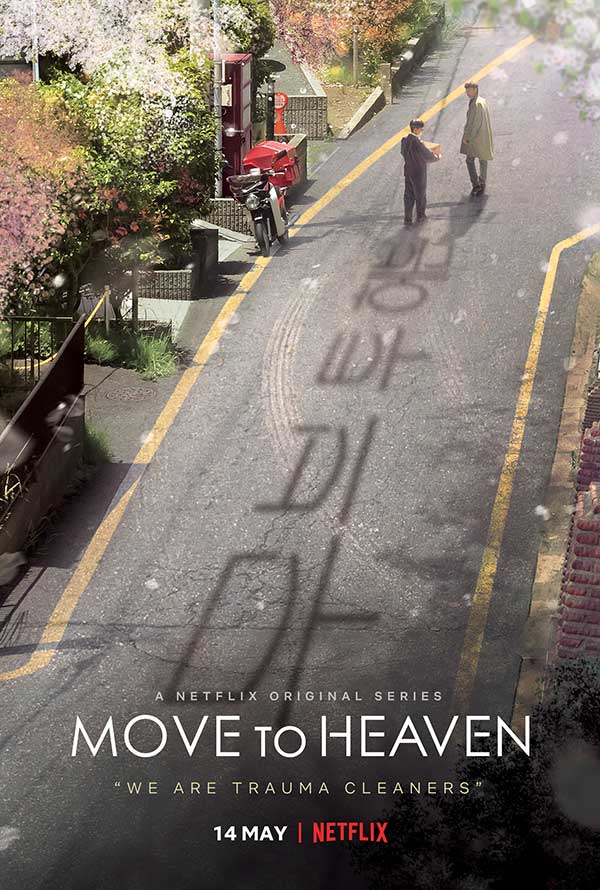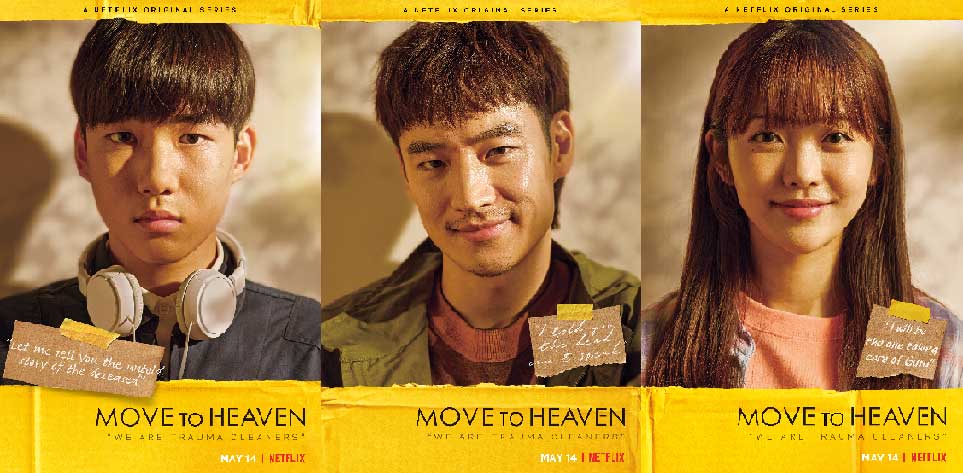
It’s a “ghost story” that will warm your hearts.
Move to Heaven is a Netflix Original Series about Geu-ru, a young man with Asperger’s syndrome, and Sang-gu who suddenly finds himself as Geu-ru’s guardian.
The two work as “trauma cleaners,” a group of people clearing out the last possessions of the deceased and uncovering stories that are left behind.
Geu-ru and Sang-gu join hands to help the final move of those who have passed away, and deliver their messages to loved ones.
Geu-ru, a young man with Asperger’s syndrome, works as a trauma cleaner with his father, Jeong-u, who runs a trauma cleaning service company “Move to Heaven.” Left all alone in the world after his father’s sudden death, Geu-ru is visited by his uncle Sang-gu, who was recently released from prison. According to Jeong-u’s will, Sang-gu becomes Geu-ru’s guardian, and the pair begins to live under the same roof—but being complete opposites, they find themselves disagreeing with each other at every turn.
Without being able to close the gap, Sang-gu reluctantly joins Geu-ru in the trauma cleaning business, and as Na-mu, Geu-ru’s neighbor who is suspicious of Sang-gu’s intentions, joins the pair, the special final move facilitated by Move to Heaven begins again. With his exceptional observation skills and memory, Geu-ru intuitively detects untold stories of the deceased, and working with Geu-ru, Sang-gu slowly finds himself changing his negative views of the world.
Standing by Geu-ru’s side, Na-mu also learns how to listen to the voices of those who have been marginalized. Geu-ru, Sang-gu, and Na-mu explore deeper meanings of life and death as well as love and loss as they as they uncover the stories hidden in the shadows of society—from a young man who died in an industrial accident to an elderly person who died alone—and tell their stories on their behalf.
Move to Heaven is an inspiring story based on a nonfiction essay Things Left Behind written by Kim Sae-byul who is also one of the first trauma cleaners in Korea.
Director Kim Sung-ho and writer Yoon Ji-ryun team up to present diverse stories left behind of those who passed away, told from the honest and unbiased perspective of Geu-ru who has Asperger’s syndrome.

The show has received attention for its lineup of cast members who are known to bring sincerity and passion to their roles: Lee Je-hoon, Tang Jun-sang and Hong Seung-hee as well as Ji Jin-hee and Lee Jae-wook who make special appearances.
“It was amazing how much the stories in the script resonated with me even though I didn’t personally experience them and I couldn’t stop the tears,” says Lee Je-hoon recalling the reason why he felt compelled to star in Move to Heaven, a heart-warming story amidst a flood of provocative and sensational stories.
Tang Jun-sang, who plays Geu-ru in the series, echoes Lee’s emotional experience of reading the script for the first time: “I read the script to episode 10 at one sitting. I didn’t want to break up the emotional flow of this engaging and moving story. I cried so much reading the script, and I wanted to help audiences feel the emotions I felt.”
To those unfamiliar with Asperger’s syndrome, it is a disorder first described in the 1940s by Viennese pediatrician Hans Asperger.
People with Asperger’s syndrome often possess autism-like behaviors and difficulties in social and communication skills. What differentiates Asperger’s Disorder from classic autism are its less severe symptoms and the absence of language delays.
Children who have Asperger’s Disorder are only mildly affected, and they frequently have good language and cognitive skills.
Lee Je-hoon and Tang Jun-sang respectively transformed themselves into Sang-gu, who has led a tough life due to his painful past, and Geu-ru, who lives with Asperger’s syndrome, to create a perfect balance between the characters.
Despite the initial bias against trauma cleaning, Sang-gu gradually changes his view on the profession and the world, while Geu-ru deeply moves audiences through his innocent and quiet recount of the various forms of death and heart-wrenching stories of the marginalized.
“There is no limit to Lee Je-hoon’s ability to portray the multi-dimensional emotional shifts of his character, and he had unmatched energy to push his emotions to the extreme,” says director Kim Sung-ho, raising the anticipation for Lee Je-hoon’s performance that artfully portrayed various emotional depths.






















